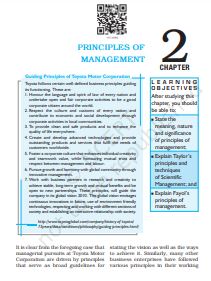‘Principles Of Management NCERT Solutions for Class 12 Business Studies Chapter 2‘ PDF Quick download link is given at the bottom of this article. You can see the PDF demo, size of the PDF, page numbers, and direct download Free PDF of ‘Ncert Class 12 Business Studies Chapter 2 Exercise Solution’ using the download button.
Principles Of Management NCERT Textbook With Solutions PDF Free Download

Chapter 2: Principles Of Management
It is clear from the foregoing case that managerial pursuits at Toyota Motor Corporation are driven by principles that serve as broad guidelines for stating the vision as well as the ways
to achieve it.
Similarly, many other business enterprises have followed various principles in their working over a period of time.
A number of management thinkers and writers have also studied principles of management from time to time.
In fact, there is a long history of management thought. Management principles have evolved and are in the continuous process of evolution.
You can see that the evolution of management thought has been very fascinating.
In this chapter, we will study the contributions of Fredrick Winslow Taylor and Henri Fayol who as you have read are associated with the classical management theory.
Both of them contributed immensely to the study of management as a discipline. Whereas F.W. Taylor was an American mechanical engineer, Henri Fayol was a French mining engineer.
Taylor gave the concept of ‘Scientific Management’ whereas Fayol emphasized ‘Administrative
Principles’. But before we go into the details of their contributions let us study the meaning of the principles of management.
Principles of Management: The Concept
A managerial principle is a broad and general guideline for decision-making and behavior.
For example, while deciding about the promotion of an employee one manager may consider seniority, whereas the other may follow the principle of merit.
One may distinguish principles of management from those of pure science. Management principles are not as rigid as principles of pure science.
They deal with human behavior and, thus, are to be applied creatively given the demands of the situation.
Human behavior is never static and so also technology, which affects business. Hence all the principles have to keep pace with these changes.
Nature of Principles of Management
By nature is meant qualities and characteristics of anything. Principles are general propositions, which are applicable when certain conditions are present.
These have been developed on the basis of observation and experimentation as well as the personal experiences of the managers.
Depending upon how they are derived and how effective they are in explaining and predicting managerial behavior, they contribute to the development of management both as a science and as an art.
| Author | NCERT |
| Language | English |
| No. of Pages | 39 |
| PDF Size | 3.2 MB |
| Category | Business Studies |
| Source/Credits | ncert.nic.in |
NCERT Solutions Class 12 Business Studies Chapter 2 Principles Of Management
1. What makes principles of management flexible?
Management principles are varied and not one rule can be applied to all cases. Thus, a manager has to assess the situation and then determine the best solution to the issue at hand. For this reason, management principles are flexible.
2. State the main objective of the time study.
A Time study was undertaken to determine a standard time that is required to complete a designated job. This time would then be set as the standard time for the job completion.
The benefit of this process is that it will help employers to determine the number of resources required to complete a particular job and also determine their wages.
3. Name the principle that is an extension of the ‘harmony, not discord’.
It is cooperation, not individualism which is the extension of the ‘principle harmony, not discord’
4. State any two causes of fatigue that may create a hindrance in the employee’s performance.
Causes of fatigue that create hindrance in the performance of employees are:
1. Not having a cordial relationship with the people in superior positions
2. Long working hours at the organization
5. Sanaklal and Gagan started their career in Wales Limited (a printing press) after going through a rigorous recruitment process. Since they had no prior work experience, the firm decided to give them one year to prove themselves. Name the principle of management followed by Wales Limited.
Wales Limited followed the principle of ‘Stability of Personnel’.
6. Which technique is used by Taylor for distinguishing between efficient and inefficient workers?
Taylor used the system of Differential Piece Wage System under which wages for workers were determined using a set standard. The workers who performed better were given higher wages than workers who performed below the standard.
NCERT Class 12 Business Studies Textbook Chapter 2 With Answer PDF Free Download
